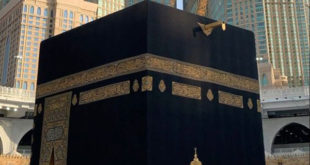عن ابن عباس رضي الله عنه قال رسول الله صلى الله عليه و سلم أبى الله أن يقبل عمل صاحب بدعة حتى يدع بدعته (الترغيب والترهيب 1/108) Hadhrat ibn Abbaas (Radhiyallahu Anhuma) reports that Rasulullah (Sallallahu Alaihi Wasallam) said: “Allah Ta’ala does not accept the actions of an innovator until …
Read More »Recent Posts
March, 2016
-
8 March
Ask Allah for all your Needs
عن أنس قال : قال رسول الله صلى الله عليه و سلم: ليسأل أحدكم ربه حاجته أو حوائجه كلها حتى يسأله شسع نعله إذا انقطع وحتى يسأله الملح. قلت : رواه الترمذي غير قوله : " وحتى يسأله الملح "رواه البزار ورجاله رجال الصحيح غير سيار بن حاتم وهو ثقة …
Read More » -
7 March
The Need to Follow the Correct Procedures
Hazrat Moulana Muhammad Ilyaas (rahmatullahi ‘alaih) once mentioned: The mistake people tend to make nowadays is that they regard the following of the correct Deeni procedures to be difficult and therefore avoid them. Without adopting the correct Deeni procedures, one cannot attain Deeni success. In worldly matters also, one is …
Read More » -
5 March
Hazrat Bilaal (radhiyallahu ‘anhu) – Part Six
Leaving Madinah Munawwarah after the Demise of Rasulullah (sallallahu ‘alaihi wasallam): There are two views recorded with regards to whether or not Hazrat Bilaal (radhiyallahu ‘anhu) remained the mu’azzin of Madinah Munawwarah after the demise of Rasulullah (sallallahu ‘alaihi wasallam). The First View: The first view is that Hazrat Bilaal …
Read More » -
3 March
Selective Islam
Hazrat Mufti Ebrahim Salejee (Daamat Barakaatuhu) mentioned: Today we have become selective Muslims. When dealing with people, we demand our rights. One says that “my rights should not be trampled” but the rights of others and Allah Ta‘ala, one is totally unconcerned of. Their rights can be trampled, one does …
Read More »
-
The Bravery of Rasulullah (sallallahu ‘alaihi wasallam) – Orchards of Love – Part 75
The Bravery of Rasulullah (sallallahu ‘alaihi wasallam) Every Nabi was a personification of total submission …
Read More » -
The Brother-in-law of Rasulullah (sallallahu ‘alaihi wasallam)
-
The Compass of the Hearts of the Sahaabah (radhiyallahu ‘anhum) – The Tolerance of Rasulullah (sallallahu ‘alaihi wasallam) – The Orchards of Love – Part Seventy Four
-
Tafseer of Surah Naazi’aat
-
The Extreme Generosity of Hazrat Talhah (radhiyallahu ‘anhu)
-
Receiving Seventy Rewards
Hazrat Abdullah bin Amr bin Aas (radhiyallahu ‘anhuma) reported, “Whoever sends salutations upon Nabi (sallallahu ‘alaihi wasallam) once, Allah Ta‘ala and His angels will send seventy mercies and blessings upon him in return of his one Durood. Hence, whoever wishes to increase his Durood should increase it, and whoever wishes to decrease his Durood should decrease it (i.e. if he wants to earn great rewards, then he should increase his Durood).”
Read More » -
Increase in Sustenance
-
The Reward of Fasting on the Day of Arafah
-
The Angel that Stands at the Blessed Grave of Hazrat Rasulullah (sallallahu ‘alaihi wasallam) to Convey the Durood of the Ummah
-
Reciting Durood when Entering the Musjid
-
Sunnats and Aadaab of the Host – 3
3. Generosity and feeding the creation was a salient quality and attribute of all the …
Read More » -
Sunnats and Aadaab of the Host – 2
-
Sunnats and Aadaab of the Host – 1
-
Sunnats and Aadaab which every person needs to adhere to in his individual life – 9
-
Sunnats and Aadaab which every person needs to adhere to in his individual life – 8
-
Hazrat Ali (radhiyallahu ‘anhu) – Part Forty-One – Being Sent by Rasulullah (sallallahu ‘alaihi wasallam) to Level the Graves, Destroy Idols and Erase Pictures
Hazrat Ali (radhiyallahu ‘anhu) reports that on one occasion, Rasulullah (sallallahu ‘alaihi wasallam) attended a …
Read More » -
Rasulullah (sallallahu ‘alaihi wasallam) Approving of the Verdict of Hazrat Ali (radhiyallahu ‘anhu) – Part Forty
-
The True Ulamaa – Hazrat Ali (radhiyallahu ‘anhu) – Part Thirty Nine
-
Du‘aa for Assistance in Settling Debts – Hazrat Ali (radhiyallahu ‘anhu) – Part Thirty Eight
-
The Concern of Hazrat Ali (radhiyallahu ‘anhu) regarding Business being Conducted According to the Islamic Principles – Part Thirty Seven
 Ihyaaud Deen An Effort to Revive Deen in Totality
Ihyaaud Deen An Effort to Revive Deen in Totality
















































































